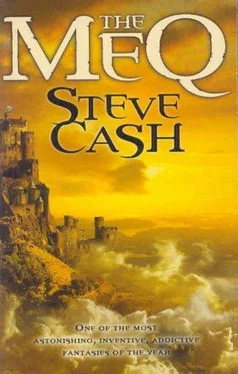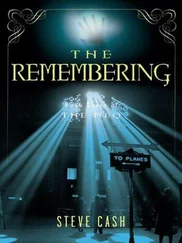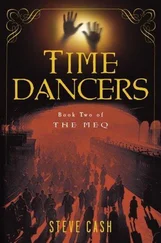Steve Cash - The Meq
Здесь есть возможность читать онлайн «Steve Cash - The Meq» весь текст электронной книги совершенно бесплатно (целиком полную версию без сокращений). В некоторых случаях можно слушать аудио, скачать через торрент в формате fb2 и присутствует краткое содержание. Год выпуска: 2005, Издательство: Del Rey, Жанр: Фэнтези, Детективная фантастика, ya, на английском языке. Описание произведения, (предисловие) а так же отзывы посетителей доступны на портале библиотеки ЛибКат.
- Название:The Meq
- Автор:
- Издательство:Del Rey
- Жанр:
- Год:2005
- ISBN:нет данных
- Рейтинг книги:4 / 5. Голосов: 1
-
Избранное:Добавить в избранное
- Отзывы:
-
Ваша оценка:
- 80
- 1
- 2
- 3
- 4
- 5
The Meq: краткое содержание, описание и аннотация
Предлагаем к чтению аннотацию, описание, краткое содержание или предисловие (зависит от того, что написал сам автор книги «The Meq»). Если вы не нашли необходимую информацию о книге — напишите в комментариях, мы постараемся отыскать её.
The Meq — читать онлайн бесплатно полную книгу (весь текст) целиком
Ниже представлен текст книги, разбитый по страницам. Система сохранения места последней прочитанной страницы, позволяет с удобством читать онлайн бесплатно книгу «The Meq», без необходимости каждый раз заново искать на чём Вы остановились. Поставьте закладку, и сможете в любой момент перейти на страницу, на которой закончили чтение.
Интервал:
Закладка:
“Friends of mine,” she said. “All of them work for the hotel, the kitchen staff. They were there and they came to help. Good friends each one.” Suddenly she dropped her smile. “Your friend — the other one — was he taken?”
“Yes,” I answered, and left it at that. I had too many questions for this woman, but this was not the place to ask. I was paralyzed from a severe blow to the spinal cord and I had no idea how long it would take to heal, if at all. I had to find shelter and find it quickly. There were still a few hours of daylight left and I wanted to be as far away as possible by nightfall. Ray had told me to trust her and I trusted Ray completely. The decision came instantly. “Can you get me out of here?” I asked. “Can you take me somewhere safe?”
“I will take you to PoPo, to our home, and. ” She paused and straightened up, tapping her finger on her lips and turning in a slow circle. “And I will take you in a wheelchair.” She almost laughed, then started up the steps. “Give me a moment,” she said, “I must borrow something from the hotel with the help of one of my friends. Do not move. I will not be long.” She stopped and covered her mouth with both hands, then dropped them slowly. “I am sorry. That was in bad taste, was it not?”
“Just hurry,” I said. Then with a smile, “Please.”
Less than fifteen minutes later she returned with one of her friends from the kitchen staff. She was pushing a crude wheelchair and he was carrying my luggage along with Ray’s.
“What about the sailor from the Atalanta ?” I asked. “Did he have any questions?”
“I never saw him,” she said. “My friend, Bakel, retrieved all of your belongings. Should I inquire?”
“No. Let’s go on. let’s leave now.” She helped me into the chair, arranging my legs and strapping me in. She was quick and efficient. “What is your name?” I asked quietly.
Without looking me in the eye or slowing down, she said, “Emme. Emme Ya Ambala.” I told her my name was Zianno, but she could call me Z. When she was satisfied I was secure, she glanced up and, in a curious mix of question and statement, said, “And you are American.”
“Yes,” I said, “and you speak English — better than most Americans.”
“Truly?”
“Yes. Truly.”
She laughed out loud. “ ‘Who might you find you have come from yourself, if you could trace back through the centuries?’ ” Then she looked over at Bakel and said something in the local dialect. We set out around the corner and down a narrow street at a rapid pace. Emme was pushing the wheelchair and Bakel was trailing, carrying our luggage. After a few blocks and several changes in direction, we finally slowed down. I turned as far as I could in the chair and caught her eye.
“Walt Whitman,” she said, never hesitating. “The great—”
“American poet,” I finished.
“That is correct,” she said, then laughed again.
The two of us spoke little the rest of the day and Bakel never spoke at all. By sunset, Saint-Louis was far behind and we had trekked almost five miles upstream on the Senegal River. We stopped for the night in the first settlement where it was possible to get riverboat passage to Kayes. Emme said we could transfer there to the one and only railroad connecting Kayes to Koulikoro on the Niger River. Where we were going from there remained a mystery. The day had been the longest I could remember. I’d lost my best friend, I’d lost the Stone, I’d lost the use of my legs, and at the end of this longest day, I was lost in Africa, completely at the mercy of a young black woman who wore a silver pearl in her nose and quoted Walt Whitman. I still had no idea why she was doing what she was doing, or how she knew I was Meq. Then I thought of Star and how lost and helpless she must feel. After that, the damp mat I was sleeping on seemed like a featherbed. I closed my eyes and waited for a dream, any dream, and let the long day go.
The next morning came too soon. Emme shook me awake and told me we had to leave right away. She handed me a flat biscuit and a bowl of something that resembled oatmeal, and I gobbled it up as if it were a gourmet meal. As I ate, I stared at the wheelchair and wondered how this would ever work. Bakel had already arranged for our things to be transferred to the riverboat, and once there, handed his duties over to another man named Masaka. While we were waiting to board, I asked Emme if she needed money for our trip, for Bakel, for Masaka, for anything. She said, “No, no, no,” brushing off the idea with a wave of her hand.
“You have many friends,” I said. “Is it like this for you everywhere in Africa?”
She laughed and pointed to the three raised horizontal lines on each of her temples. “It is because of these,” she said. “These signify to others that I am a granddaughter of a wise man, a holy man. For that reason Bakel and the others wish to help. By doing so, they believe it will enhance their own lives.”
“Is it true? Are they better off for it?”
“I think so,” she said, “but only because of Obongelli. He has true powers.”
“Who is Obongelli?”
“My grandfather. He is also called PoPo. He is the one I take you to see. He may be able to heal you. I know he will be overjoyed to see you.”
“That explains why everyone is helping you,” I said, “but why are you helping me?”
“Because of this,” she answered, changing her expression and pointing to the silver pearl in her nose. “It is Meq. It is from one of your Starstones.”
“What? How in the world do you know about that?” I involuntarily reached down for the Stone in my pocket, then remembered it was gone.
Emme smiled and said, “I will let PoPo tell you about this truth. It is only right, and he should be the one.” She pushed me and the wheelchair on board the riverboat, which was badly in need of repair, then leaned over my shoulder saying, “Now we go home and you must tell me all about America on the way.”
“Where is home?” I asked.
“Dogon land,” she said, “deep in the Federation of West Africa.”
“Is that anywhere near Mali?”
“Yes, more or less. We live south of the Niger River and north of the Volta River, on the edge of the Dolo Valley.”
Without explaining or mentioning Star or the Fleur-du-Mal, I managed a faint smile built on faint hope, and said, “Good.”
For the next two and a half weeks, we traveled in a generally eastward direction, leaving the green world and humid climate of western Senegal for a landscape that occasionally reminded me of Kepa’s camp in America — dry, reddish brown, and remote. Masaka stayed with us until we reached Koulikoro, where he told Emme he must return to his family. As far as I know, he never once inquired about who I was or why she was caring for me. From there, we took another boat ride north and east, downstream on the Niger River, until we disembarked and began our journey overland. Emme procured two donkeys for the trip, securing me, our luggage, and the wheelchair to one of them, while she led the way on the other. The donkeys were thin and old, but they served us well, and three weeks later we were nearing Dogon land.
Emme and I talked often along the way about Africa and her life there. She was opposed to the French presence in her homeland, but she was also obsessed with a Frenchman, a doctor she referred to as A. B. or Antoine. It was obvious she was in love with him, although she never expressed it openly. He was the reason she had been in Saint-Louis. She had wanted to apologize to him. “For what?” I asked. “For not believing in something,” she said. “Not believing in what?” I asked her. “In him,” she answered quietly.
My own obsessions I kept to myself. I thought about Ray almost every day and worried about Star every night. I wondered why I wasn’t healing and constantly had to tell myself that I would, that my Meq blood would eventually find the source of the injury and renew all damaged nerves and tissue. That’s what I told myself, but as each day passed and my legs remained paralyzed, I wondered more and more if it was still true.
Читать дальшеИнтервал:
Закладка:
Похожие книги на «The Meq»
Представляем Вашему вниманию похожие книги на «The Meq» списком для выбора. Мы отобрали схожую по названию и смыслу литературу в надежде предоставить читателям больше вариантов отыскать новые, интересные, ещё непрочитанные произведения.
Обсуждение, отзывы о книге «The Meq» и просто собственные мнения читателей. Оставьте ваши комментарии, напишите, что Вы думаете о произведении, его смысле или главных героях. Укажите что конкретно понравилось, а что нет, и почему Вы так считаете.












